
Entertainment
-
 DiscoverEU marks 40 years of Schengen with 40,000 free travel passes for young Europeans
The European Commission is celebrating the 40th anniversary of the Schengen Area by offering 40,000 young Europeans the chance to explore the continent through DiscoverEU, part of the31 October 2025Read More...
DiscoverEU marks 40 years of Schengen with 40,000 free travel passes for young Europeans
The European Commission is celebrating the 40th anniversary of the Schengen Area by offering 40,000 young Europeans the chance to explore the continent through DiscoverEU, part of the31 October 2025Read More... -
 Brussels universities to award honorary doctorates to Stromae, Lize Spit, and Amélie Nothomb
The Vrije Universiteit Brussel (VUB) announced on Monday that Stromae, Lize Spit, Amélie Nothomb, François Schuiten, and Ever Meulen will receive joint honorary doctorates from VUB and27 October 2025Read More...
Brussels universities to award honorary doctorates to Stromae, Lize Spit, and Amélie Nothomb
The Vrije Universiteit Brussel (VUB) announced on Monday that Stromae, Lize Spit, Amélie Nothomb, François Schuiten, and Ever Meulen will receive joint honorary doctorates from VUB and27 October 2025Read More... -
 Stolen Renaissance masterpiece returns to Italy after 52 years
After more than half a century, a stolen Renaissance painting has finally returned home to Italy. *Madonna with Child*, a tempera-on-wood masterpiece by Venetian painter Antonio Solario,31 July 2025Read More...
Stolen Renaissance masterpiece returns to Italy after 52 years
After more than half a century, a stolen Renaissance painting has finally returned home to Italy. *Madonna with Child*, a tempera-on-wood masterpiece by Venetian painter Antonio Solario,31 July 2025Read More... -
 Belgian seaside resorts: highlights of royal De Panne
While Ostend is often dubbed the queen of Belgium’s seaside resorts, the country’s coastline offers many other gems worth discovering. In this series, Belga English explores four distinctive20 July 2025Read More...
Belgian seaside resorts: highlights of royal De Panne
While Ostend is often dubbed the queen of Belgium’s seaside resorts, the country’s coastline offers many other gems worth discovering. In this series, Belga English explores four distinctive20 July 2025Read More... -
 Louis Vuitton named suspect in Dutch money laundering probe
Luxury fashion house Louis Vuitton has been named a suspect in a Dutch money laundering investigation, according to the Dutch Public Prosecution Service (OM). The OM alleges that18 July 2025Read More...
Louis Vuitton named suspect in Dutch money laundering probe
Luxury fashion house Louis Vuitton has been named a suspect in a Dutch money laundering investigation, according to the Dutch Public Prosecution Service (OM). The OM alleges that18 July 2025Read More... -
 Brussels tops global rankings for international meetings as tourism soars to new heights
Brussels has once again secured its position as the world’s top city for international meetings, according to the latest annual report from the Union of International Associations (UIA).26 June 2025Read More...
Brussels tops global rankings for international meetings as tourism soars to new heights
Brussels has once again secured its position as the world’s top city for international meetings, according to the latest annual report from the Union of International Associations (UIA).26 June 2025Read More... -
 Coffee prices keep climbing in Czech establishments
The cost of a cup of coffee in Czech restaurants and cafés has increased by 4% over the past year, now averaging CZK 57.80, according to data from the Dotykačka point-of-sale system.15 June 2025Read More...
Coffee prices keep climbing in Czech establishments
The cost of a cup of coffee in Czech restaurants and cafés has increased by 4% over the past year, now averaging CZK 57.80, according to data from the Dotykačka point-of-sale system.15 June 2025Read More...
News
-
 Indonesia takes delivery of first Rafale fighter jets in $8 billion defence upgrade
Indonesia has officially taken delivery of its first Rafale fighter jets from France, marking a major milestone in the country’s push to modernise its ageing military fleet.Read More...
Indonesia takes delivery of first Rafale fighter jets in $8 billion defence upgrade
Indonesia has officially taken delivery of its first Rafale fighter jets from France, marking a major milestone in the country’s push to modernise its ageing military fleet.Read More... -
 EU must build over 2 million homes annually by 2035 to avert housing crisis, new data shows
The European Union will need to build more than two million new homes every year until 2035 to keep up with soaring demand, according to new projections released by the EuropeanRead More...
EU must build over 2 million homes annually by 2035 to avert housing crisis, new data shows
The European Union will need to build more than two million new homes every year until 2035 to keep up with soaring demand, according to new projections released by the EuropeanRead More... -
 Police raid homes and offices of French Culture Minister Rachida Dati in corruption probe
French police searched Culture Minister Rachida Dati’s home and offices on Thursday as part of a widening corruption investigation linked to her tenure as a European Parliament lawmaker,Read More...
Police raid homes and offices of French Culture Minister Rachida Dati in corruption probe
French police searched Culture Minister Rachida Dati’s home and offices on Thursday as part of a widening corruption investigation linked to her tenure as a European Parliament lawmaker,Read More... -
 White Christmas unlikely in Switzerland, MeteoSwiss says
The chances of a white Christmas in Switzerland are slim, with snowfall in the lowlands virtually ruled out, according to the Federal Office of Meteorology and Climatology (MeteoSwiss).Read More...
White Christmas unlikely in Switzerland, MeteoSwiss says
The chances of a white Christmas in Switzerland are slim, with snowfall in the lowlands virtually ruled out, according to the Federal Office of Meteorology and Climatology (MeteoSwiss).Read More... -
 Guy Parmelin elected Swiss President for 2026 with record-breaking vote
Economics Minister Guy Parmelin will serve as President of the Swiss Confederation in 2026, securing the office with a result that sets a new benchmark for the current millennium.Read More...
Guy Parmelin elected Swiss President for 2026 with record-breaking vote
Economics Minister Guy Parmelin will serve as President of the Swiss Confederation in 2026, securing the office with a result that sets a new benchmark for the current millennium.Read More... -
 Nigeria seeks French support to tackle insecurity, Macron says
Nigerian President Bola Tinubu has requested increased support from France to combat escalating insecurity in the country’s north, French President Emmanuel Macron said on Sunday,Read More...
Nigeria seeks French support to tackle insecurity, Macron says
Nigerian President Bola Tinubu has requested increased support from France to combat escalating insecurity in the country’s north, French President Emmanuel Macron said on Sunday,Read More... -
 Swiss army has “gone back to sleep,” says departing chief
Switzerland briefly awakened to the urgency of national defence following Russia’s 2022 invasion of Ukraine — but has since drifted back into complacency, outgoingRead More...
Swiss army has “gone back to sleep,” says departing chief
Switzerland briefly awakened to the urgency of national defence following Russia’s 2022 invasion of Ukraine — but has since drifted back into complacency, outgoingRead More...

Most Read
- Teen held after US woman killed in London stabbings
- Football: Farhad Moshiri adamant Everton deal above board
- Greece hails new post-bailout chapter but concerns remain
- The Kokorev case caused wide discussion in Brussels
- EU accession talks stir debate in Moldova: insights from Gagauzia's leader, Yevgenia Gutsul
Politics
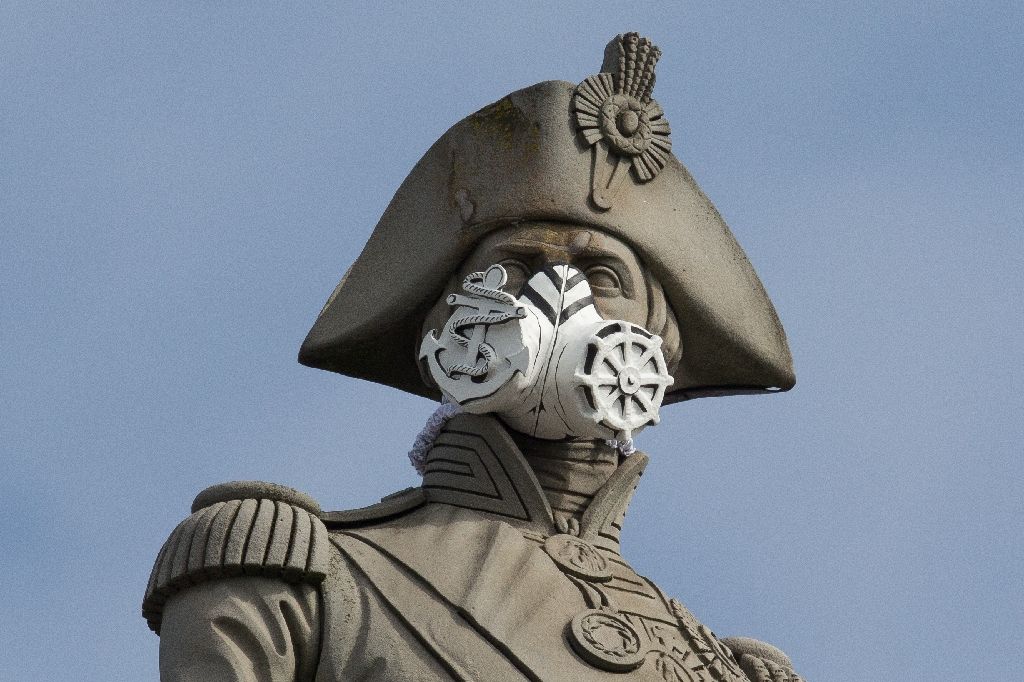
British environmental activists put face masks on famous statues across London on Monday including the one of Horatio Nelson on Trafalgar Square to draw attention to the problem of air pollution.
Two Greenpeace campaigners scaled the 52-metre (171-foot) high Nelson's Column in the early hours of Monday to put a mask on the famous naval commander.
Masks were put on 17 statues, including Queen Victoria near Buckingham Palace, Eros at Piccadilly Circus and Winston Churchill outside parliament.
London's Metropolitan Police said that eight people had been arrested -- two on Trafalgar Square, four on Parliament Square and two on Hyde Park Corner.
A parliament spokeswoman confirmed there had been "a minor security incident on the parliamentary estate" which was being dealt with by the police.
Greenpeace said it aimed to highlight the health risks caused by the city's poor air quality.

A British Airways plane struck an object believed to be a drone as it was coming in for landing at Heathrow, Europe's busiest airport, police said.
An investigation has been launched into the incident, which follows a string of near misses involving drones and is believed to be the first case of a collision in Britain.
The plane, an Airbus A320 with 132 passengers and five crew on board, was on its final descent into Heathrow when it was struck.
"A pilot on an inbound flight into Heathrow Airport from Geneva reported to police that he believed a drone had struck the aircraft," a spokeswoman for London's Metropolitan Police said.
"The flight landed at Heathrow Terminal Five safely. It transpired that an object, believed to be a drone, had struck the front of the aircraft".
A BA spokesman said the plane had been examined after landing and was cleared to operate its next flight.
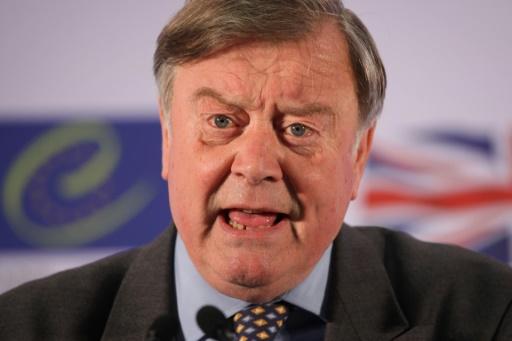
A senior lawmaker in David Cameron's Conservative party warned Saturday that the prime minister "wouldn't last 30 seconds" if Britain votes to leave the European Union in a June referendum.
Cameron confirmed this week that he intends to stay and oversee the process of leaving the 28-member bloc if voters back a so-called Brexit, despite leading the campaign to remain.
But Ken Clarke, a pro-European who served as a minister under Cameron as well as former Conservative premiers John Major and Margaret Thatcher, said such a situation would be "farcical".
"The prime minister wouldn't last 30 seconds if he lost the referendum and we'd be plunged into a Conservative leadership crisis which is never a very edifying sight," he told BBC radio.
At a rally for the campaign to leave the EU, leading Brexit supporter and London mayor Boris Johnson said the prime minister should stay in office regardless of the outcome of the referendum.
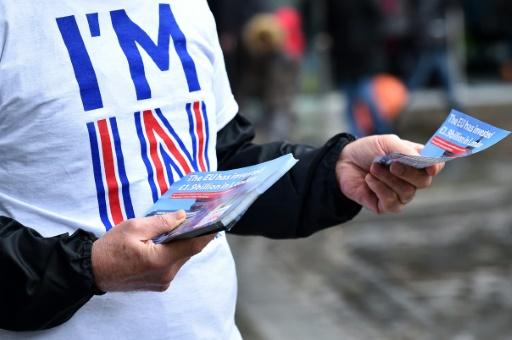
A time traveller from 1975 would find Britain's EU referendum strikingly familiar -- except that the two main parties have swapped roles on whether or not to remain in the bloc.
A prime minister, trying to appease the Eurosceptic wing of his fractured party, calls a vote on membership and encourages Britons to stay in, after securing some concessions from Brussels.
But back in 1975, when Britain voted on whether to stay in the European Economic Community it had joined two years earlier, it was a Labour prime minister calling the vote rather than a Conservative one.
In the June 5, 1975 referendum, 67 percent followed Harold Wilson's advice to stay in the EEC -- a result Conservative Prime Minister David Cameron would be more than happy with from the June 23 vote this year.
The Conservative opposition, under their new leader Margaret Thatcher, staunchly defended Britain's EEC membership, with the Iron Lady even seen campaigning in a jumper with the nine member states' flags on.
She accused Labour of putting Britain's future at risk in a bid to end their own infighting.
"The referendum is a tactical device to get over a split in their own party," she told parliament.
Her transformation to visceral euroscepticism was still 15 years into the future.
Today, the infighting is in the Conservative ranks, while Labour is broadly united in defending Britain's place in the European Union, the successor to the EEC.
Jeremy Corbyn, the socialist leader of the opposition Labour Party, spelled out his reasons for staying in on Thursday -- despite a long personal track record of Euroscepticism, including voting out in 1975.
"In contrast to four decades ago, the EU of today brings together most of the countries of Europe and has developed important employment, environmental and consumer protections," he said.
Professor Sara Hobolt, a European politics expert at the London School of Economics university, said the EU nowadays is about much more than just free trade, the main concern of its EEC predecessor.
"Centre-left parties in Europe find it easier to be pro-EU today than they did in the 1970s," she said.
- Europe has also changed -
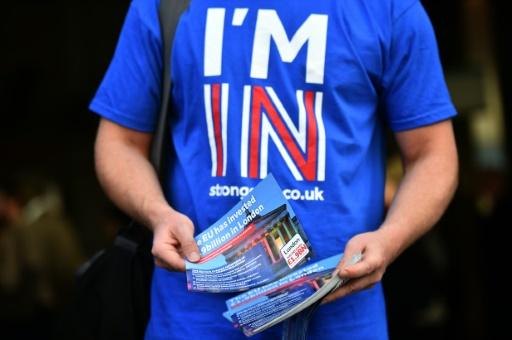
Activists hit the streets Friday for the first official day of campaigning over Britain's "Brexit" referendum, firing the starting pistol on a tense 10-week battle over the country's future in Europe.
Opinion polls suggest the British public is evenly split ahead of the June 23 vote, which could bring down Prime Minister David Cameron and plunge one of the world's leading economies into uncertainty.
The referendum -- Britons' first direct say on the divisive issue of Europe in 41 years -- is also being nervously watched in Washington and Brussels, where a British exit would add to a long list of EU crises.
"We absolutely think we're going to win it," Peter Reeve, a spokesman for the UK Independence Party (UKIP), told AFP as he campaigned in Peterborough -- a market town in eastern England where an influx of East European workers has angered many locals.
Charismatic London Mayor Boris Johnson will lead a "Brexit blitz" with rallies on Friday and Saturday where he will try to persuade Britons that they could thrive if cut free from European Union red tape.
Johnson has compared leaving the 28-country bloc to escaping from prison, saying the referendum was "like the jailer has accidentally left the door of the jail open and people can see the sunlit lands beyond".
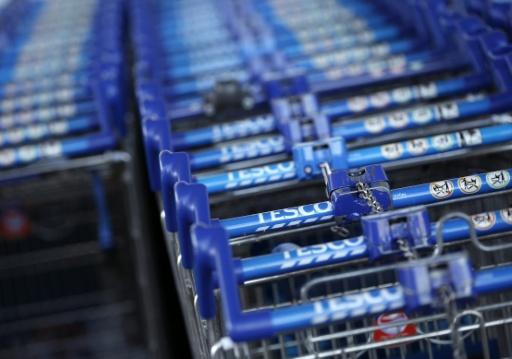
Tesco said Wednesday that it rebounded into slender annual net profits on strong sales, after a vast property writedown and challenging home trade sparked a record loss the previous year.
The troubled British supermarket giant revealed that earnings after taxation stood at £138 million ($197 million, 172 million euros) in its 2015/2016 financial year, which ran until the end of February.
That contrasted sharply with a enormous loss of £5.7 billion in 2014/2015, Britain's biggest retailer added in a results statement.
Pre-tax profits meanwhile stood at £162 million after a loss of £6.3 billion last time around.
Tesco hailed the "significant progress" as it returned to full-year profits, and also revealed the first quarter of sales growth for three years.
Like-for-like sales in home market Britain, stripping out the impact of new floor space, grew 0.9 percent in the group's fourth quarter.
Tesco -- which was rocked by crisis in October 2014 after overstating profits in an accounting error -- is the world's third-biggest supermarket chain after France's Carrefour and global leader Walmart.
- 'Regained competitiveness' -
"We have made significant progress against the priorities we set out in October 2014," said chief executive Dave Lewis in the earnings release.
"We have regained competitiveness in the UK with significantly better service, a simpler range, record levels of availability and lower and more stable prices.
"Our balance sheet is stronger and we are making good progress in rebuilding trust in Tesco and our investment case."
However, Lewis cautioned that the supermarket titan continues to face a "challenging, deflationary and uncertain market".
The group also warned that its investment in price cuts would slow its profit improvement particularly in the first half, sending its share price down sharply in Wednesday morning deals.
Tesco shares lost 4.81 percent to 186.85 pence, topping the fallers board on London's FTSE 100 benchmark index of top companies. The FTSE was however 1.11 percent higher at 6,311.7 points.
In recent years, Tesco's performance has been hurt by increased competition in Britain, particularly from German-owned discount retailers Aldi and Lidl, as well as Morrisons, Sainsbury's and Walmart-owned Asda.
In a bid to turn around its fortunes, Tesco appointed outsider and former Unilever executive Lewis in July 2014 to replace long-standing chief executive Philip Clarke.
Lewis said Wednesday that management actions had "stabilised" the business, which he admitted was in "crisis" when he replaced Clarke.
- Cost-cutting drive -
In January 2015, the Tesco boss launched a cost-cutting drive under which he has closed 60 unprofitable shops and axed plans to open another 49 branches.
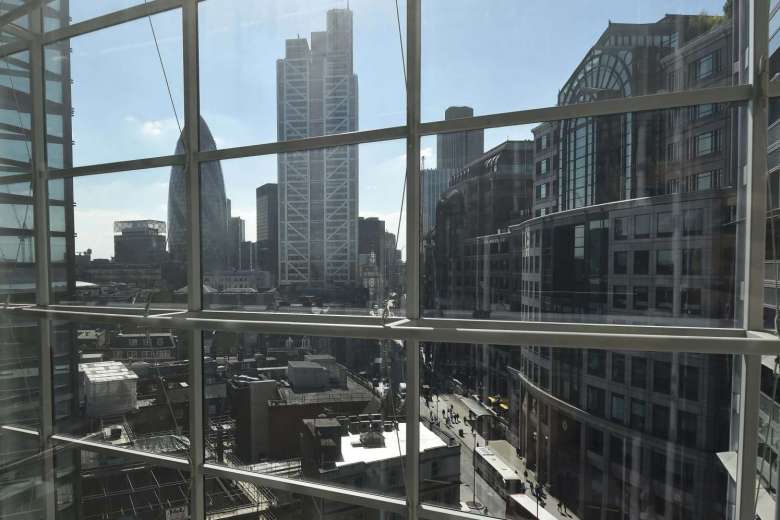
As-well as shining a spotlight on the secret financial arrangements of the rich and powerful, the so-called Panama Papers have laid bare London's role as a vital organ of the world's tax-haven network.
The files leaked from Panama law firm Mossack Fonseca exposed Britain's link to thousands of firms based in tax havens and how secret money is invested in British assets, particularly London property.
Critics accuse British authorities of turning a blind eye to the inflow of suspect money and of being too close to the financial sector to clamp down on the use of its overseas territories as havens, with the British Virgin Islands alone hosting 110,000 of the Mossack Fonseca's clients."London is the epicentre of so much of the sleaze that happens in the world," Nicholas Shaxson, author of the book Treasure Islands, which examines the role of offshore banks and tax havens, told AFP.
The political analyst said that Britain itself was relatively transparent and clean, but that companies used the country's territories abroad - relics of the days of empire - to "farm out the seedier stuff", often under the guise of shell companies with anonymous owners.
"Tax evasion and stuff like that will be done in the external parts of the network. Usually there will be links to the City of London, UK law firms, UK accountancy firms and to UK banks," he said, calling London the centre of a "spider's web".
"They're all agents of the City of London - that is where the whole exercise is controlled from," Richard Murphy, professor at London's City University, said of the offshore havens.
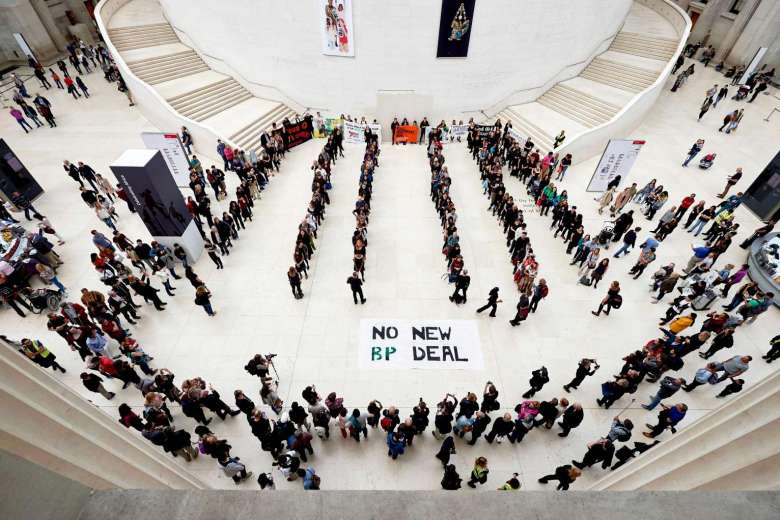
Activists staged a demonstration inside one of London's biggest museums on Sunday (April 3) in protest at its sponsorship links with energy giant BP.
A 20-strong group of activists held what they called a "disobedient exhibition" inside the British Museum in central London.
The mock exhibition was entitled "A History of BP in 10 Objects", a play on "A History of the World in 100 Objects", a recent British Museum show."It features objects sent from all over the world by communities impacted by BP's environmental destruction and human rights abuses, including crude oil from the Gulf Coast spill," the activists said in a statement.
They claimed BP's support - largely focused on special exhibitions - represented 0.8 per cent of the central London museum's annual income.
Last September, the self-styled "theatrical campaign group", named "BP Or Not BP?", held a similar protest inside the museum with demonstrators dressed in black to resemble an oil slick, forming the word "No".
The new protest came as 91 figures including actors Emma Thompson and Mark Rylance, fashion designer Vivienne Westwood and campaigner Bianca Jagger signed a letter to the Guardian newspaper about the issue.
They urged the museum's new director, Hartwig Fischer, who takes up his post on Monday, not to renew BP's sponsorship deal and instead "seek funding from sources more in line with the museum's values".
The British Museum, which has free admission except for special exhibitions, attracts seven million visitors each year.

Cunning gentleman thieves have seduced romantics from the days of Robin Hood through to Hollywood's heyday - and now London is transfixed by the real-life antics of the "Wimbledon Prowler".
The prolific burglar is suspected of carrying out hundreds of break-ins around one of London's most exclusive neighbourhoods, making off with assets worth more than £10 million (S$19.2 million).
The quaint, upscale neighbourhood of Wimbledon Village in the British capital's smart southwest is sheltered from the hustle of city life, and known mainly for its famous tennis tournament and multimillion-pound mansions.
But fear now stalks the leafy streets in the form of the "Wimbledon Prowler", as the light-fingered criminal has been nicknamed by the British press.
In a decade of deception, the thief has committed more than 200 burglaries, making mockeries of locks, alarms and security camera systems to pilfer luxury watches, jewellery and cash, detective inspector Dan O'Sullivan told AFP.
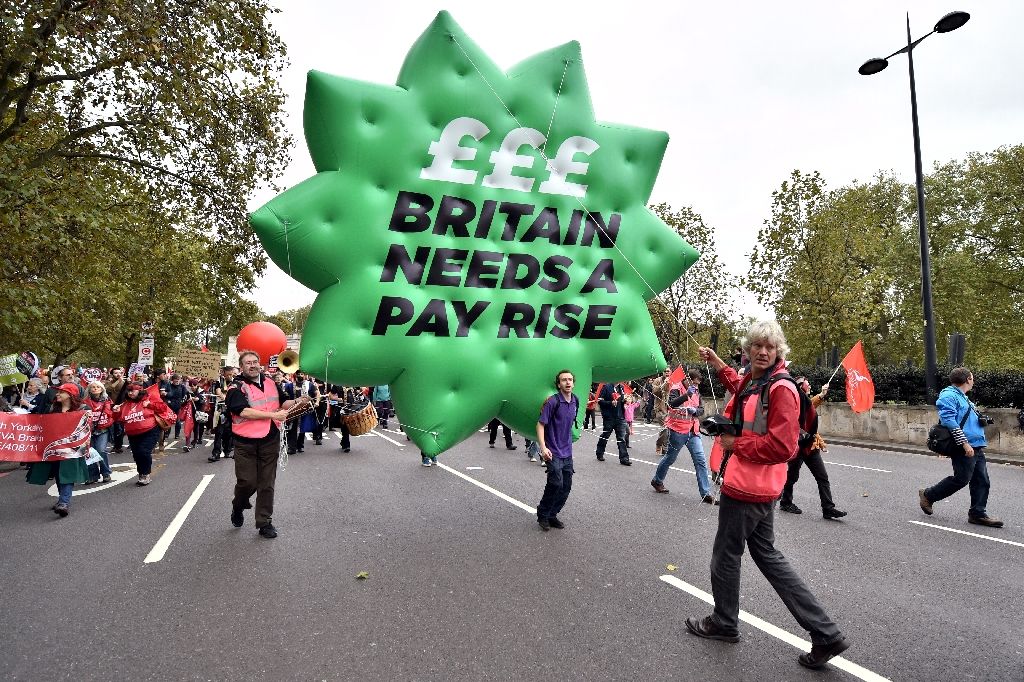
Britain's Conservative government raised the minimum wage that is pocketed by more than a million people Friday, trumpeting it as a transformative step for the economy but winning few plaudits from employers or austerity-weary unions.
Affecting between 1.3 million and 1.8 million people according to varying estimates, the minimum gross salary for all British workers aged over 25 climbed by 7.5 percent to £7.20 ($10.36, 9.10 euros) an hour as of April 1, a pay boost that far outstrips inflation.
The pay rise, first announced by Prime Minister David Cameron's government last July, represents a complete about-turn for the Conservative party, which opposed the introduction of the minimum wage in 1999 when then prime minister Tony Blair's Labour was in power.
"The National Living Wage will play a central role in moving Britain to a higher wage, lower tax, lower welfare economy," British finance minister George Osborne said as the pay boost came into effect.
"It will also mark the end of the gender pay gap for some of our lowest paid and hardest working people."
The opposition Labour party criticised the policy as a "cruel sleight of hand", however, pointing to the government's enactment of sharp cutbacks in welfare spending.
- Stagnant wage growth -
Other nations, too, have raised minimum wages in recent years to address stagnant wage growth and inequality between rich and poor.
France lifted the minimum wage at the start of this year to almost 9.70 euros an hour.
Germany launched a minimum wage one year earlier at 8.50 euros, where it remains.
And in the United States, California plans to raise the pre-tax minimum wage to $15 per hour (13.28 euros) in a move which might be followed by other US states.
In Britain, where unemployment is relatively low at around 5.0 percent, large wage inequalities persist and London School of Economics professor Alan Manning described the new living wage as "more symbolic" than anything else.
"It's significant but I don't think one should exaggerate its significance," he told AFP.



















